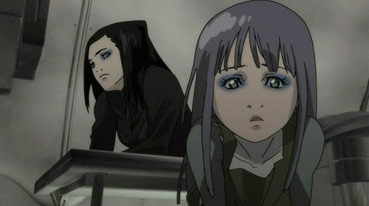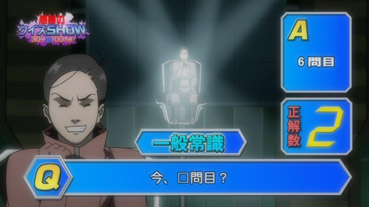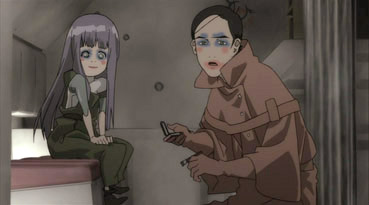| |
"When I was little I thought that if I died the world would end too. A childish delusion. I couldn't forgive the world for continuing on without me." |
| |
Re-l Mayer |
| |
"I am me, not someone else. It was very strange, I know. While my memory is unreliable, I've always been certain of that." |
| |
Vincent Law |
I genuinely didn't know what to expect from volume 4 of Ergo Proxy, and I mean that as a compliment of the highest order. An intriguing series from the start, Volume 3 upped the ante by putting the plot almost on hold for three episodes to take a complex philosophical trip inside the heads of the main characters and did so in a manner that played almost like a direct challenge to those to like to dismiss anime as simplistic and action-driven. For those of us who had been following the series from the start, it was not a complete bolt from the blue – there have been many sometimes coded references to classical philosophy before then – but it still blindsided us a little, making the earlier episodes feel like a warm-up for the more challenging stuff to come. I, for one, was thrilled by this new direction the series had taken, but it left wide open the question of where it would go next. A return to the more formal narrative of the opening episodes? A further philosophical abstraction? Or were we to be treated to further experimentations of form that have not yet been explored? Well how about all three...
As ever I'm assuming that if you're reading this then you've already seen the first three volumes of Ergo Proxy. If not, do so, or at the very least check the reviews of Volume 1, Volume 2 and Volume 3 to acquaint yourself with its universe and characters. The episode names quoted below are those for the western version, with the subtitle translation of the Japanese originals in brackets.

Following three episodes of philosophical character exploration, the final episode of Volume 3 returned us to the story and pointed fugitive Vincent Law, rogue security operative Re-l Mayer and the cogitive virus-infected young AutoReiv (a form of android) Pino in the direction of The Mosk Dome, which Vincent, despite the confirmation of his proxy status, is still convinced will provide answers to the questions of his true identity and past life. The first episode here, Wrong Way Home (Conceptual Blind Spot), may be the most conventional of the quartet, but its viewpoint still differs from the previous norm. As Re-l, Vincent and Pino shelter from a snowstorm, Re-l's Entourage (an AutoReiv that functions as a personal assistant), Iggy, is dispatched from the domed city of Romdo to locate them. Previously loyal to Re-l in the manner that AutoReivs are programmed to be, Iggy has developed what he believes is a soul and is has been convinced by Romdo's ruling body that to be separated from Re-l is to lose his raison d'être, a situation he decides he can remedy by killing Vincent, the one he holds responsible for taking Re-l from him. His new-found self-awareness has also unzipped an openly vocalised contempt for Re-l, whom he describes to her face as "Re-l the selfish, Re-l the useless, Re-l the incomplete." It's a viewpoint that Re-l herself goes some way to confirming in the way she behaves towards her companions and her cry of "My God, how am I supposed to survive without Iggy?!" when neither Pino nor Vincent is able to attend to her hair. A self-contained story with an inevitable but well handled conclusion, Wrong Way Home effectively sets the oddball trio off on their journey towards Mosk Dome. But if you like your storylines at least reasonably straightforward then savour what you've just watched, as it's the last you'll see of anything approaching a conventional narrative for the next fifty minutes.
Episode 14, Ophelia (Someone Like You), kicks off with the trio stocking up on supplies at a superstore in a deserted but machine-maintained city of the sort first encountered back in episode 10, Cytopropism. It begins in relatively uncomplicated fashion, but that doesn't last long. Re-l gets spooked by noises and half-seen visions, then begins exhibiting almost schizophrenic mood swings and changes of mind. Both she and Vincent start to experience reality shifts, repeating lines they have just spoken, appearing at different locations too quickly to have walked there, and in one case recovering instantly and unaware from a fall that should have caused serious injury. By the halfway mark it's clear that the characters are experiencing some sort of duality, but is it of identity, of time, or of existence itself? Only Pino seems to have a clear grasp on things, but her brief clarification proves only of minimal help in the second half, as Vincent becomes caught in a repeating event loop with a Russian roulette take on the need to separate manufactured illusion from reality.

No sooner have you got your head back in order than it's slapped silly by Episode 15, Who Wants to Be in Jeopardy! (Out of Control), which takes the form of manic Japanese TV game show called The Nightmare Quiz on which Vincent is the sole contestant, quizzed by a typically and infuriatingly energetic host named MCQ. Vincent has the run of the show to get a million points in a variety of games, ranging from general knowledge to identity guessing – if he succeeds then MCQ will be instantly killed, but if his score falls short of the magic million then Vincent will die in his place. Astonishingly, the show plays out in real time and runs the entire length of the episode. No clear explanation is given for where this is taking place or why, and while the obvious conclusion is that we are in Vincent's dream world, a brief mid-episode interruption suggests that the whole thing is being transmitted back to Romdo and is being watched and puzzled over by security chief Raul Creed. Intriguingly, neither Vincent nor Re-l appear to have a clue what's going on either and co-operate only because they don't seem to know what else to do.
Initially random, the questions asked of Vincent begin to provide back-story information on the development the proxies and the environmental catastrophe that led to the domed cities. Unusually for the series, the episode also has its share of character comedy, particularly in the differing attitudes of Re-l and Pino, who are co-opted at one point to act as guest contestants, a role that Pino delights in but Re-l huffily refuses to fulfil. There's an lovely moment when the three are given boards on which to draw or write the identity of an object disguised by a digital mosaic and Pino simply draws the pixelated pattern that has been presented to her, but the best gag occurs in the opening quick-fire round when Vincent is asked to identify the show's theme music – he gives the right answer but we never hear it, a deliberate tease for the fans who were asking that very question on the show's first Japanese TV screening (it's Kiri by Monoral in case you're new to the series).
But my favourite episode of Volume 4 and one of my favourites of the series so far has to be 16, Busy Doing Nothing (Dead Calm), which although lacking the structural and narrative complexity of the two episodes that precede it is still a storytelling gamble, but one whose execution is absolutely on the nose. True to its title, the episode sees the wind-powered ship on which Vincent, Re-l and Pino are travelling becalmed in a wasteland, leaving the impatient Re-l with nothing to do but contemplate her environment and situation. Told almost exclusively from her viewpoint via her diary entries, the episode compellingly deconstructs her character through her own irritability and her increasingly tetchy observations of her companions. Vincent proves a source of particular irritation, from his worn-out socks and the noises he makes when eating to his habit of repeatedly leaving the toilet seat up. Even her icily iconic image suffers under such conditions as she worries about a facial pimple and uses too much of their water ration on cleaning her hair, while her all important eye make-up is hijacked by Pino to transform herself and Vincent into clownish parodies of the Re-l look. The episode shines in its character detail, lacing its depiction of the slow encroachment of cabin fever with some glorious deadpan humour and a cluster of moments that will be instantly familiar to anyone who has ever found themselves even a little irritated by the extended company of another.

As ever the character drawing is excellent, and despite the use of that slightly stuttering frame rate common to anime (an economy and speed measure that requires the creation of far fewer cells), some of the animation itself is impressively naturalistic, with Re-l clearly the animators' favourite. The soundtrack matches the images all the way, the dark synthesiser hums sometimes as reminiscent of Full Metal Jacket as they are of Blade Runner, the series' most recognisable touchstone.
Having taken the series into more challenging and compelling ground, Volume 3 was always going to be a tricky one to follow but Volume 4 is every bit its equal, in its structural experimentation, its wonderful character moments and even, unexpectedly, its humour. It's time to put aside whatever prejudices you might be harbouring about the anime genre, for intellectually and artistically, Ergo Proxy is rapidly proving to be the essential science fiction series of the moment.
Once again there are no complaints with the transfer, with the show's generally dark look, particularly evident in the first and last of this set, never lacking in detail or displaying any obvious problems. Episode 15 breaks from the norm in every respect, reproducing the bright colours and graphics of a TV game show, and there are no issues here either.
The same trio of soundtracks as in previous volumes is included here, namely Japanese 5.1, English 5.1 and English DTS and again there's aurally little difference between them. Music and location atmospherics are always well recorded and mixed.
Although not indicated on the setup menu, as well as English subtitles there are also optional subtitles for on-screen text, which you'll need during Episode 15 whatever language you choose. Unless you can read Japanese fluently, of course. These are on by default for both soundtracks.
Just a couple of trailers for other MVM releases Berserk (1:48) and Speed Grapher (1:26).
I keep waiting for Ergo Proxy to put a foot wrong but hoping it won't, and it hasn't done so yet. Four more episodes and a whole bundle of surprises and delights, all delivered with imagination and real style. The DVD looks and sounds as good as ever, the only complaint being the lack of extra features. Other than that, highly recommended.
|